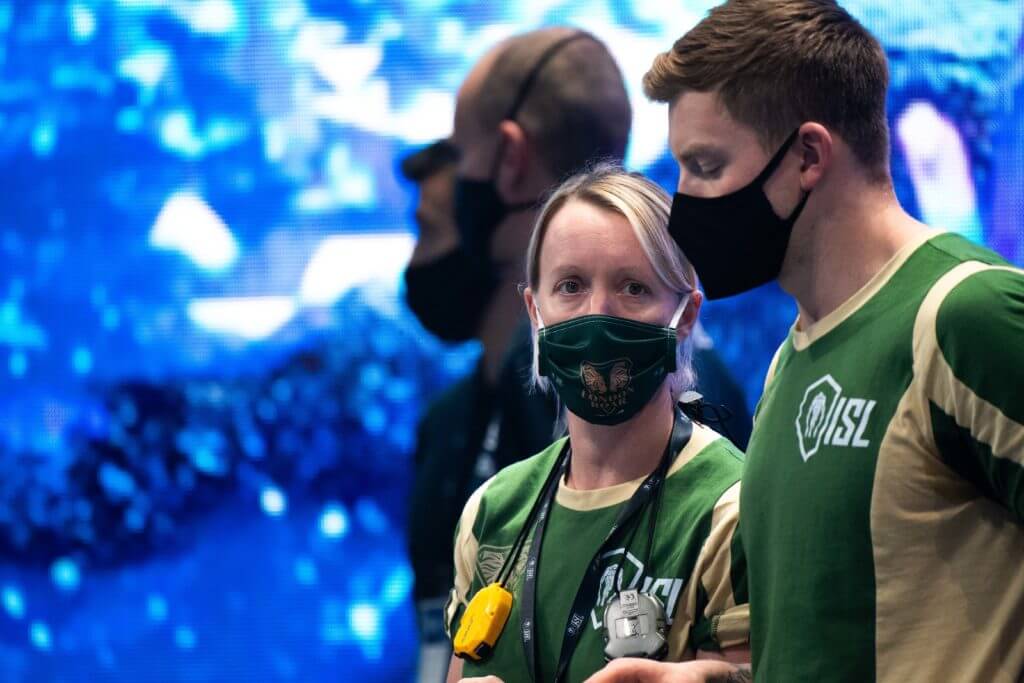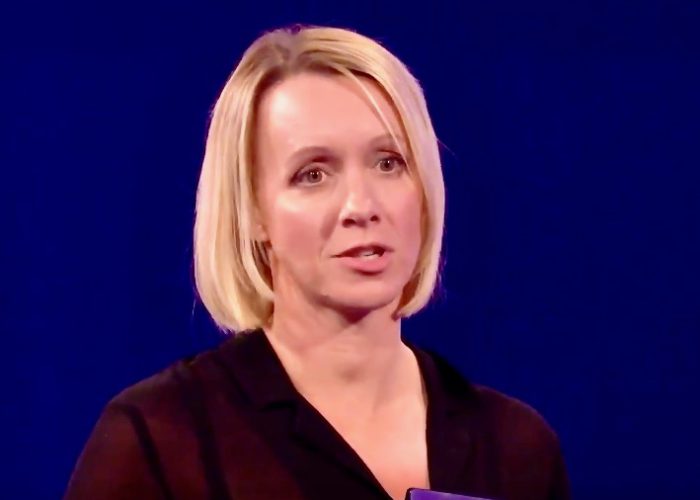Mel Marshall Selected To UK Sport Programme Aiming To Increase Female Coach Numbers

Mel Marshall – the woman who guided Adam Peaty to Olympic gold – is one of six women heading a UK Sport leadership initiative that plans to more than double the number of female coaches across Britain’s Olympic and Paralympic programmes by Paris 2024.
Women hold just 10% of coaching positions across those programmes at present but the new leadership initiative will involve Marshall among six top female UK coaches providing key support and mentoring for the next generation of elite coaches.
Marshall will join Paula Dunn (para athletics), Kate Howey (judo), Bex Milnes (para triathlon) and Tracy Whittaker-Smith (trampolining) in allowing other female coaches to observe them in their high-performance environment while Karen Brown, who spent over 15 years as a coach for Great Britain Hockey and England Hockey, will act as a mentor throughout the programme.
UK Sport is working with performance directors, coach developers and talent pathway managers within the high-performance community, as well as UK Coaching, to nominate female coaches who have potential to coach at the Olympic and Paralympic Games at Paris 2024 and beyond.
The nomination process will close shortly and coaches will be finalised by the end of the year.
The leadership programme forms part of UK Sport’s long-term plan to address the current under-representation of female coaches at all levels of the talent pathway within the high-performance community.

Melanie Marshall – Photo Courtesy: Action Woman Twitter
Significantly increasing the number of female coaches available for Paris 2024 is the first target of this long-term plan.
Marshall is perfectly-placed to pass on her wisdom having guided Peaty to Olympic, world, European and Commonwealth titles.
Luke Greenbank – who won 200 backstroke bronze at the 2019 World Championships in Gwangju – is also coached by Marshall at Loughborough National Training Centre.
She said:
“It’s important that people see what is possible and I am honoured to be part of this project with UK Sport and with a group of extremely successful female coaches from across the Olympic and Paralympic environment.
“We have to talk about opportunities for women in high-performance coaching and we shouldn’t be afraid to have those conversations, talk about our ambitions and challenge those not supporting them.
“UK Sport are leading the way on this through their ambition and I am extremely excited to be a part of the project and am looking forward to sharing my knowledge and experiences with up-and-coming coaches as well as everyone else involved.”
CEO at UK Sport Sally Munday added:
“UK Sport is determined to see greater diversity across the high-performance community and this programme will focus on seeing more women at the top end of high performance.
“Coaches, alongside athletes, are at the heart of our high-performance community and we firmly believe that a more diverse cohort of highly-skilled coaches will help more of our Olympic and Paralympic athletes realise their potential.
“There are currently far too few female coaches operating at the highest level of performance and we are committed to addressing this reality and, working with our stakeholders, driving the change we want to see.”
“The programme arises from UK Sport’s People Development Team, working in partnership with sports and stakeholders to address diversity and inclusion ambitions, removing barriers and introducing bespoke programmes, with gender the first characteristic and other initiatives to follow.
“At present, approximately only 10% of coaching positions within the high-performance community in the UK are held by women.
“The first target of UK Sport’s long-term plan is to ensure that by the Olympic and Paralympic Games in 2024, the number of female coaches available to Team GB and ParalympicsGB has more than doubled to 25%.
“Working with key stakeholders, UK Sport has a responsibility to play a part in closing gender gaps by focusing on diversifying the high-performance coaching community and increasing opportunities for female coaches to take up senior and leadership roles.”
A piece we published in September that offers an insight into Marshall’s coaching approach
Mel Marshall On Coaching Adam Peaty and Preparing Athletes For the Biggest Platform of all
Mel Marshall says that creating independent athletes is paramount for a coach if they are to succeed on the biggest stage of all.
Marshall has coached Adam Peaty to Olympic, world, European and Commonwealth gold with the Briton having taken the 100m breaststroke into new waters.
The double Olympian is also coach to Luke Greenbank who took 200m backstroke bronze at the 2019 World Championships in Gwangju where he went on to swim the lead-off as Great Britain won the men’s 4x100m medley relay.

Photo Courtesy: Mel Marshall and Adam Peaty
For Marshall the work done in the weeks, months and years before an event will mean that an athlete is physically and mentally prepared for what lies ahead.
In a film for Team England, Marshall said:
“I think the one thing that needs to be remembered is, with any multi-sport event, there’s the preparation coach and there’s the arena coach, and I think if you’re doing a good job as a coach – a preparation coach – then your athletes should arrive at these events responsible, independent, confident and capable.
“I think if you mollycoddle athletes and if you prepare the road for the athletes, rather than prepare the athlete for the road, they will get very lost very quickly and things will get very stressful in that environment.
“So it’s about making independent athletes, and then when you turn into arena coach mode, when you’re actually in the environment with the athlete it’s your job to quieten down the noise and flatten the waves, it’s your job to bring it back to what it’s about.
“There can be 5,000 people watching, 10,000 people watching, a large amount of social media following, your mum and dad in the crowd, but it’s about bringing it back down to the small things, which is your event.
“The court is the same size, the pool is the same size, you’ve been doing it since you were 10 years of age, and really making sure that athletes know that it’s the same job, that it’s the same business that they’ve been doing every single day since they were a young kid.”
Ever wondered what it takes to coach a champion? To make sure they are prepared for the biggest stages in sport?
To celebrate #UKCoachingWeek2020, we spoke to @massivemel to find out
— Team England (@TeamEngland) September 15, 2020
Marshall has the most painful of experiences to draw on. She led the 200 free world rankings in 2004 but intense training following the British trials had left her feeling drained and ill-prepared and optimism had turned to dread going into the Athens Games where she finished 16th.
In an article to mark International Women’s Day, Mel Marshall told Swimming World:
“I just didn’t feel I was ready, I felt quite frightened about it. I felt like training hadn’t gone as well as I had liked it to go.
“I just felt overwhelmed. I was aware that in the arena I would be in, I couldn’t arrive in that place where I hadn’t had the perfect preparation.
“I just wanted it to be over.”

Marshall won world, European and Commonwealth medals – including six at Melbourne 2006 – before retiring following the Beijing Olympics in 2008.
She then became head coach at the City of Derby club where a 14-year-old Peaty came along one day with his friend Kyle.
Although Marshall was quite unimpressed with Peaty’s freestyle, she immediately knew he was special when she saw his breaststroke and the wheels were set in motion.
He made his senior international long-course debut at the 2014 Commonwealth Games where he won gold in the 100m breaststroke and with England’s medley relay as well as 50m silver.
Since then the pair have been on an odyssey that has seen Peaty become the first man to not only swim inside 58secs but also break the 57-sec barrier when he touched in 56.88 at the 2019 World Championships.
Peaty – who in September became a father when partner Eiri Munro gave birth to George-Anderson – would have been the overwhelming favourite at Tokyo 2020 and only the second swimmer to retain the 100m title after four-time Olympic champion Kosuke Kitajima.
Now he will have to wait until July 2021 when the rescheduled Games are due to go ahead.
On what it takes to coach a champion, Marshall said:
“I think as a coach you need to be ahead of the game, five steps ahead of the athlete all the time. You need to be five steps ahead of what’s happening around the world.
“You need to be five steps ahead of managing yourself, and managing your time, and making sure that you are able to deliver your best effort, and best performance as a coach every single day.
“And I think it’s about discipline and I think it’s about consistency so if you have 16, 32, 48 weeks of excellent consistency as a coach, then the results will come to you.
“And I think it’s really important that when you’re preparing to be a champion or you’re preparing to get the best out of yourself that you get the best out of yourself every day and you’re honest with that.”





